Ecuador is an “eloquent example” of the threat posed by local criminal groups that collaborate with foreign drug traffickers.
The United Nations Office on Drugs and Crime UNODC’s report on the global cocaine market highlights the fragmentation and outsourcing of drug trafficking as two key trends that have emerged in recent years. Fragmentation refers to the division of larger criminal organizations into smaller groups that specialize in specific phases of the drug supply chain, while outsourcing refers to the use of small and medium-sized groups to manage parts of the supply chain without possessing the drug.
Increase in violence
These trends have led to an increase in violence in Ecuador, where local criminal groups collaborate with foreign drug traffickers. The Sinaloa and Jalisco Nueva Generación cartels, both based in Mexico, control the trafficking corridors from Mexico to the United States, but they partner with local criminal groups and street gangs to distribute cocaine across North America.
Similarly, the Brazilian criminal group Primer Comando Capital (PCC) has expanded its presence in other South American countries, including Ecuador.
The report states that traffickers from the Balkans and members of Italian criminal groups have also settled in Ecuador to establish supply lines to European markets.
The outsourcing of drug trafficking has created a system of “service providers” who manage parts of the supply chain without possessing the drug. These small and medium-sized groups collect cocaine from ports, provide local transportation, and protect shipments at the request of transnational organizations. They guarantee delivery of the cocaine for a fee based on drug quantities, and some groups receive payment for their services in kind, which drives the availability of cocaine in the domestic market of transit countries.
Lieutenants of foreign criminal groups often travel to set up operations with local suppliers, and this interrelationship between gangs from different areas has led to an increase in violence in Ecuador. The country has seen a drastic increase in homicide rates, which is related to drugs. The violence is due to the rivalry between coalitions of local groups affiliated with the Sinaloa and Jalisco Nueva Generación cartels.
The Sinaloa Cartel changed its way of operating in 2019 and now entrusts its business to small cells of intermediaries, who travel to Ecuador to establish traffic with local “contractors” and then leave the country. It no longer has a fixed operation with Mexican envoys permanently based in Ecuador. The international actors act mainly as financiers, while the national gangs oversee the logistics and dispatch of large shipments of cocaine to Europe, according to the Ecuadorian police.
New methods require new policing
The UNODC report also highlights the growing use of cryptocurrencies in drug trafficking. Criminal organizations are increasingly using cryptocurrencies to launder money and pay for drug shipments, which makes it harder for law enforcement to track and seize their assets. The report notes that the use of cryptocurrencies is particularly prevalent in countries with weak anti-money laundering and counter-terrorism financing regimes.
The fragmentation and outsourcing of drug trafficking and the use of cryptocurrencies have significant implications for law enforcement agencies. Traditional approaches to drug enforcement, such as targeting large criminal organizations, may no longer be effective. Instead, law enforcement agencies will need to focus on disrupting the small cells of intermediaries that manage the drug supply chain, as well as cracking down on the use of cryptocurrencies to launder money.
The report also highlights the importance of international cooperation in tackling drug trafficking. Criminal organizations are highly mobile and operate across multiple jurisdictions, making it difficult for any one country to tackle the problem alone. The report calls for increased cooperation between countries in sharing intelligence and coordinating operations to disrupt drug trafficking networks.


0 Comments